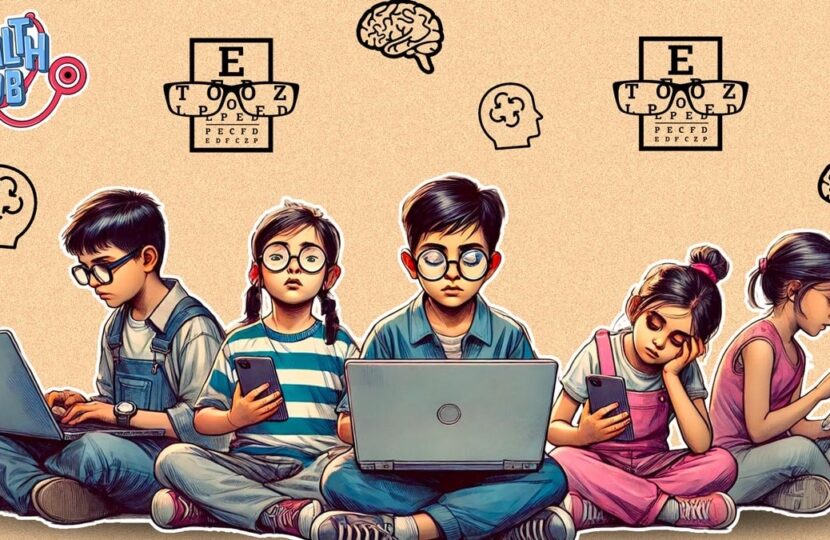Excessive Screen time and mental health: In today’s modern digital era, technology is both a boon and a challenge. Smartphones, tablets, laptops, and other gadgets have revolutionized how we live, work, and learn. However, excessive screen time, especially among children’s and adolescents, poses significant risks to their mental well-being. While these tools are vital for education and entertainment, but the long-term implications of overuse cannot be ignored. Let’s understand the connection and significance of Excessive Screen Time and Mental Health in children’s and adolescents.
The Impact of Excessive Screen Time
1. Decline in Academic Performance: Excessive screen time distracts children’s and adolescents and pull their attention away from academics. Online platforms like social media, gaming, and video streaming encourage procrastination and postponement of important tasks, lead’s to poor attention spans and declining interest in studies. The pursuit of instant gratification diminishes their ability to focus on long-term goals, results in lower grades and reduced academic achievements.
2. Negative Effects on Physical Health: Spending excessive time on gadgets fosters a sedentary lifestyle that can lead to:
- Obesity and weight gain due to lack of physical activity.
- Eye strain and digital vision problems caused by prolonged screen use.
- Postural issues from improper ergonomics during screen time.
- Disrupted sleep patterns, which affect physical and mental health.
These health challenges, when unchecked, may escalate into chronic conditions like diabetes and cardiovascular problems.
3. Mental Health Challenges: Excessive gadget use impacts adolescents’ ability to express emotions and communicate effectively. Over-reliance on social media platforms like Instagram, Snapchat, and YouTube leads to:
- Increase feeling of anxiety and stress.
- Difficulty in managing emotions and conflicts.
- Poor relationships with family and peers.
- Passive-aggressive behavior and emotional withdrawal.
4. Development of Instant Gratification Mindset: Digital platforms are designed to offer quick rewards, encourage immediate pleasure-seeking behavior. Adolescents often prioritize short-term enjoyment, such as gaming or binge-watching, over meaningful tasks, long-term activities like academics or creative pursuits. This mindset can hinder their ability to manage delayed gratification and build dependency on digital platforms.
5. Rigid Thinking and Stubborn Behavior: Social media algorithms often create echo chambers, reinforce adolescents’ beliefs and limit their exposure to diverse perspectives. This can lead to:
- Increased resistance to new ideas.
- Stubborn behavior and a lack of intellectual flexibility.
- Impaired critical thinking skills necessary for personal and academic growth.
6. Decline in Social Skills and Relationships: Excessive virtual engagement reduces face-to-face interactions, which are essential for developing:
- Empathy and patience.
- Effective communication skills.
- Understanding of social cues.
This lack of real-world interaction often results in social isolation, make it hard for children’s and adolescents to build meaningful relationships and develop interpersonal skills.
How Live Again India Promotes Mental Well-Being
At Live Again India, we are committed to help families and adolescents achieve a healthy balance in the digital age. Our mental wellness programs address the challenges of excessive screen time through a multi-faceted approach:
1. Digital Detox Programs: We guide adolescents and families to set practical boundaries on gadget usage and prioritize offline activities.
2. Mental Health Counseling: Our expert counselors help adolescents manage anxiety, improve emotional expression, and build resilience.
3. Workshops on Assertive Communication: We equip adolescents and families with essential communication skills to improve relationships and resolve conflicts.
4. Physical Activity and Mindfulness Sessions: We encourage participation in hobbies, sports, and mindfulness practices to enhance physical and mental health.
5. Parenting Guidance Programs: Our programs empower parents to implement effective strategies for managing their children’s screen time while fostering a nurturing home environment.
Tips for Managing Screen Time
- Set Clear Boundaries: Establish rules around screen usage, such as limiting screen time during meals and before bed.
- Encourage Outdoor Activities: Promote sports, hobbies, and other offline activities to reduce excessive engagement with gadget.
- Lead by Example: Parents should model healthy digital habits, such as limiting their own screen time.
- Promote Digital Awareness: Teach children and adolescents about the potential risks of excessive screen time, including online scams and cyberbullying.
- Engage in Family Time: Spend quality time together to strengthen emotional bonds and reduce dependence on gadgets.
Visit us at www.liveagainindia.com to explore our programs and resources. Together, we can create a future where technology enhances our lives without compromising well-being.
Empower your family today with Live Again India – your partner in mental wellness.



